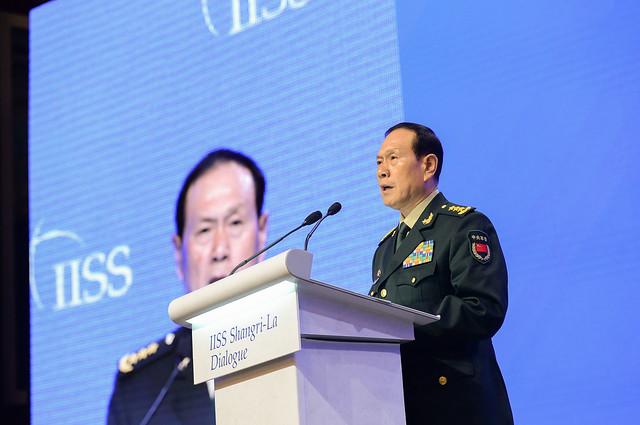
The defence supremos of the US and China had a face-off in Singapore at the weekend.
Both sides came for a compare-and-contrast contest conducted as a rhetorical rumble. The two biggest players in the game exchanged stares, plus plenty of jabs and a few kicks. The handshakes were less convincing than the glares.
The event was the 18th annual Shangri-La Dialogue, hosted by the International Institute for Strategic Studies, drawing defence ministers and military chiefs from ‘38 countries across Asia, Australia, North America and Europe’.
In the opening keynote address, Singapore’s Prime Minister Lee Hsien Loong said that the most important bilateral relationship in the world is beset by ‘tensions and frictions’ that’ll define the international environment for years to come.
Americans now talk openly of containing China, and to do so soon before it is too late—the way they used to talk about the USSR and the Soviet bloc. This negative view of China has permeated the US establishment … In China, views are hardening too. There are those who see the US as trying to thwart China’s legitimate ambitions, convinced that no matter what they do or concede on individual issues, the US will never be satisfied … The fundamental problem between the US and China is a mutual lack of strategic trust. This bodes ill for any compromise or peaceful accommodation.
So the stage was set for the showdown that framed the conference. As is traditional, the first session on Saturday was devoted to a speech by the US defence secretary and questions from the audience.
Then came the novelty. The first session on Sunday was a mirror version, devoted to a speech by China’s defence minister, followed by questions. It’s only the second time China’s minister has come to Shangri-La. The previous visit was in 2011; that seems like an era long ago in calmer, happier times.
The US acting defence secretary, Patrick Shanahan, laid out the charge sheet against China and the terms of the US challenge in the workmanlike manner to be expected from an engineer who spent 30 years at Boeing.
China’s defence minister, General Wei Fenghe, performed with the discipline of an artillery officer who joined the People’s Liberation Army at 16 and has risen to the Central Military Commission (a salute at the end of his speech, another at the end of questions). The PLA came ready to rumble, sending a delegation of 54 people, including 11 generals.
One of the best moments in Shanahan’s performance was his response to the final question of his session (posed by a Chinese major general) about how his Boeing experience would shape his Pentagon role.
‘China was our biggest customer and our biggest competitor; you have to understand how to live in that duality’, Shanahan replied. ‘We can develop a constructive relationship and we can understand how to compete in a constructive way.’
The duality dynamic was illustrated by a bit of simultaneous dual theatre from the Americans. As Shanahan rose to speak, the US also released its Indo-Pacific strategy report.
The report reprised and amplified America’s critique of China as a revisionist power: ‘As China continues its economic and military ascendance, it seeks Indo-Pacific regional hegemony in the near-term and, ultimately global preeminence in the long-term.’ (The Russia headline was as sharp, calling Russia ‘a revitalized malign actor’.)
In response, Wei described security issues as ‘daunting and complex’ but said military relations with the US were ‘generally stable, despite twists and difficulties’.
‘As for the recent trade friction started by the US, if the US wants to talk, we will keep the door open. If they want to fight, we will fight till the end’, Wei said.
‘As the general public of China says these days, “A talk? Welcome. A fight? We’re ready. Bully us? No way”.’
The general’s speech was Beijing boilerplate. Then came questions and Wei tackled almost everything tossed at him—around 20 questions delivered in two tranches. About the only question he didn’t touch was one on whether China is still a communist state.
On the militarisation of the South China Sea, Wei used the same line several times. China was merely responding to all those foreign naval vessels: ‘In the face of heavily armed warships and military aircraft, how can we not deploy any defence facilities?’
To a question about ‘concentration camps’ in Xinjiang (see ASPI’s mapping of the ‘re-education camps’), Wei replied that there’d been no terrorist attacks there in two years and China’s policy was to deradicalise and reintegrate people.
On this year’s 30th anniversary of the Tiananmen Square massacre, Wei answered: ‘How can we say China didn’t handle the Tiananmen incident properly? That incident was political turbulence and the central government took measures to stop the turbulence which is a correct policy. Because of that handling of the Chinese government, China has enjoyed stability and development.’
The result of the face-off? It was, of course, inconclusive. Not a draw. Just one round in a contest with many more rounds to come.

